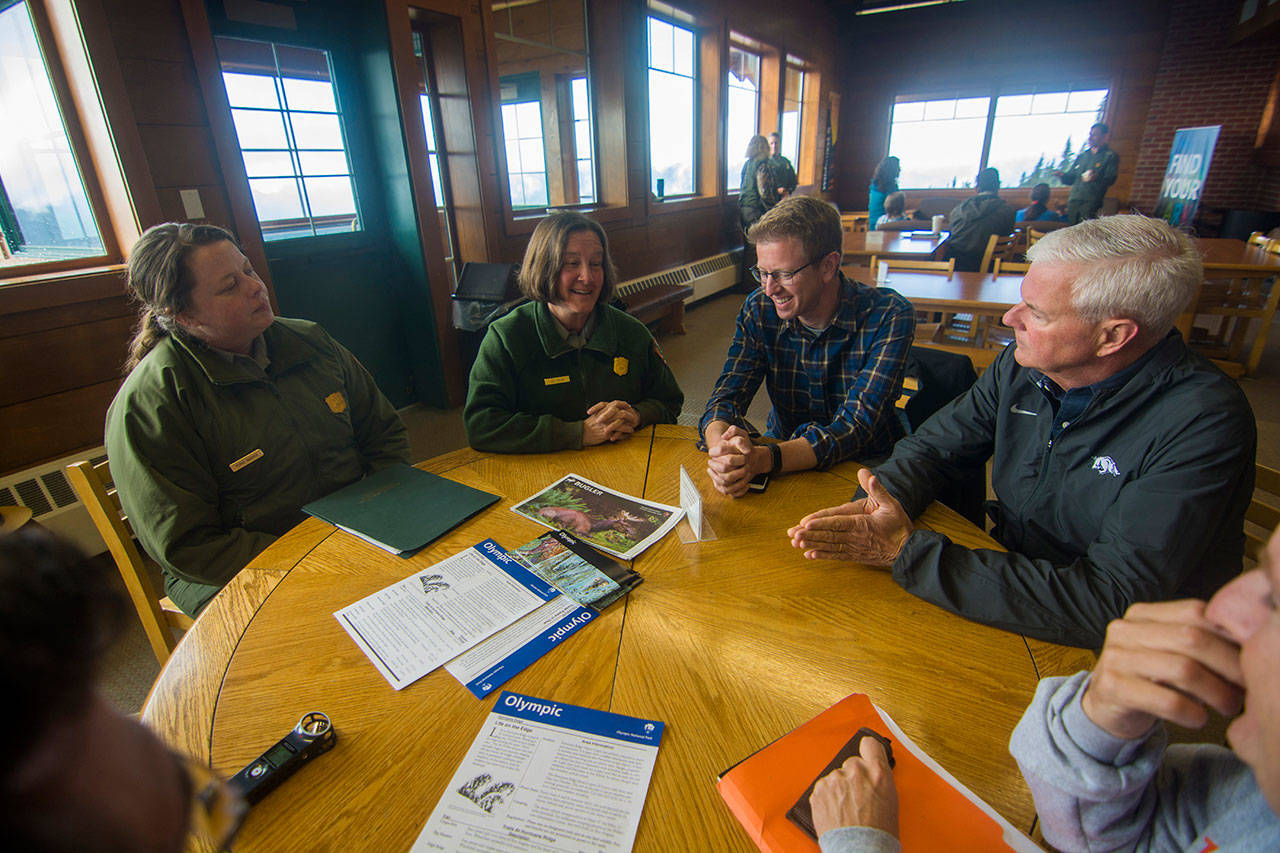OLYMPIC NATIONAL PARK — U.S. Rep. Derek Kilmer, a Democrat, is hosting the Republican chair of the House Budget Committee on a tour of his district as the two appropriators look at how the federal budget affects the Olympic Peninsula and the Puget Sound region.
Kilmer’s first stop with Rep. Steve Womack, R-Ark., was at Hurricane Ridge in Olympic National Park on Sunday, where park officials told them of their $120 million maintenance backlog and about how Congress’ inability to pass budgets slows projects and makes funding unpredictable.
Womack, who also co-chairs the eight-person Joint Select Committee on Budget and Appropriations Process Reform that Kilmer sits on, said he was looking to learn about the differences and similarities in the issues the Olympic Peninsula and Puget Sound face when compared to his district in Arkansas. He was also looking to build his relationship with Kilmer.
“It’s a Republican getting to know a Democrat and a Democrat getting to know a Republican,” Womack said. “Everywhere I go, the common complaint I hear from people is ‘you guys just don’t work together,’ and maybe if we build some more of these relationships … we’re going to find a way to get a lot of the things that divide us put behind us and make things better for the American people.”
For stop 1 of our #bipartisan exchange, @rep_stevewomack & I visited @OlympicNP. We talked about the maintenance backlog and how every $1 invested in our parks returns $10 to the local economy. We also viewed the Elwha Dam removal project, the largest of its kind in the world. pic.twitter.com/h55ylK7vM5— Rep. Derek Kilmer (@RepDerekKilmer) September 16, 2018
The two also had plans Sunday and today to visit the Port of Tacoma, the Puget Sound Naval Shipyard, a timber mill and the Lower Elwha Klallam Tribe. Kilmer plans to visit Womack’s district in the near future.
Kilmer told park staff of a bipartisan bill that would help address the $120 million maintenance backlog at Olympic National Park.
On Thursday, the House Natural Resources Committee voted to advance the Restore Our Parks and Public Lands Act, a bill Kilmer co-sponsored in July that would use half of the federal government’s income from energy production on federal lands and offshore to address the $12 billion National Park Service maintenance backlog.
Kilmer told dozens of people involved in the mountain goat relocation effort at Olympic National Park that he is optimistic Congress could pass the bill before the end of the year.
“There’s a fair amount of momentum around [this] proposal to deal with the park maintenance backlog,” Kilmer said in an interview Sunday. “It’s one of those too often rare things where you see Democrats and Republicans generally agree that we should resolve this and now there is a converging agreement on how we pay for it.”
Lee Taylor, deputy superintendent at ONP, told Kilmer and Womack the bill would be an “incredible opportunity” to address the park’s maintenance backlog.
Olympic National Park has 462 buildings, 20 campgrounds, more than 600 miles of trails and covers 922,650 acres.
Of the $120.7 million in deferred maintenance, $88.6 million is identified for road repairs.
Taylor said the park’s top priority is to work on its water and wastewater systems, which combined are estimated to cost $6 million.
The park has an annual budget of about $12 million for the park’s day-to-day operations, she said.
“Some of our highest priority maintenance backlog projects have a lot to do with things that aren’t immediately visible to the public, but believe me, if anything goes wrong with them, then the public will be quite aware,” she said. “We would be thrilled actually to have some funding allocated to be able to address those problems and take care of that infrastructure.”
Taylor also talked to the congressmen about process inefficiencies that slow the park’s projects.
“One of the processes that is time consuming for us — and I don’t think it is a negative thing — is our public engagement process and documentation process for the National Environmental Policy Act, Endangered Species Act and National Historic Preservation Act,” she said.
“I know there’s interest with this administration in streamlining those processes. I’d like to see those processes be as efficient as possible … but I would say that from my perspective as a park deputy superintendent, I don’t want to see a weakening of the legislation that’s in place to help protect these resources in the way that we implement the work that we do.”
One project that is expected to take a few years is the potential relocation of Olympic Hot Springs Road, which has been repeatedly washed out by the Elwha River since the removal of the river’s two dams concluded in 2014.
The effort requires two Environmental Assessments. The first is to determine whether the park should move forward with testing that would determine whether it is feasible to move the road.
If deemed feasible, a second Environmental Assessment is required to look at the options the park has for addressing access to the Elwha Valley.
“The notion that that will take many years, we’ve gotten a lot of calls about,” Kilmer said. “That’s not just a funding issue, that’s a process issue and we have to figure out what we’re doing.”
________
Reporter Jesse Major can be reached at 360-452-2345, ext. 56250, or at jmajor@peninsuladailynews.com.

